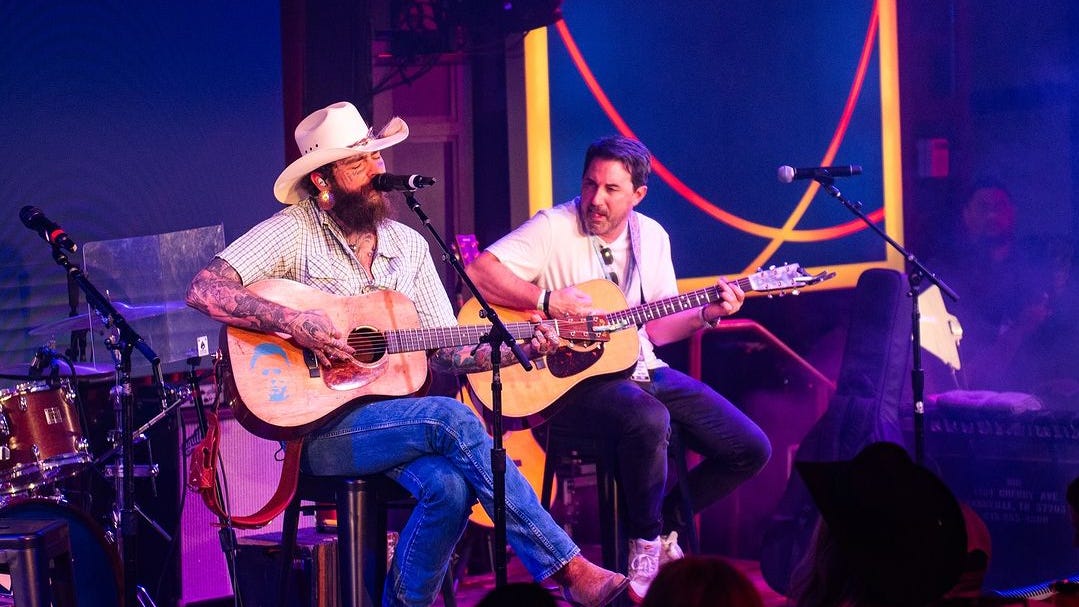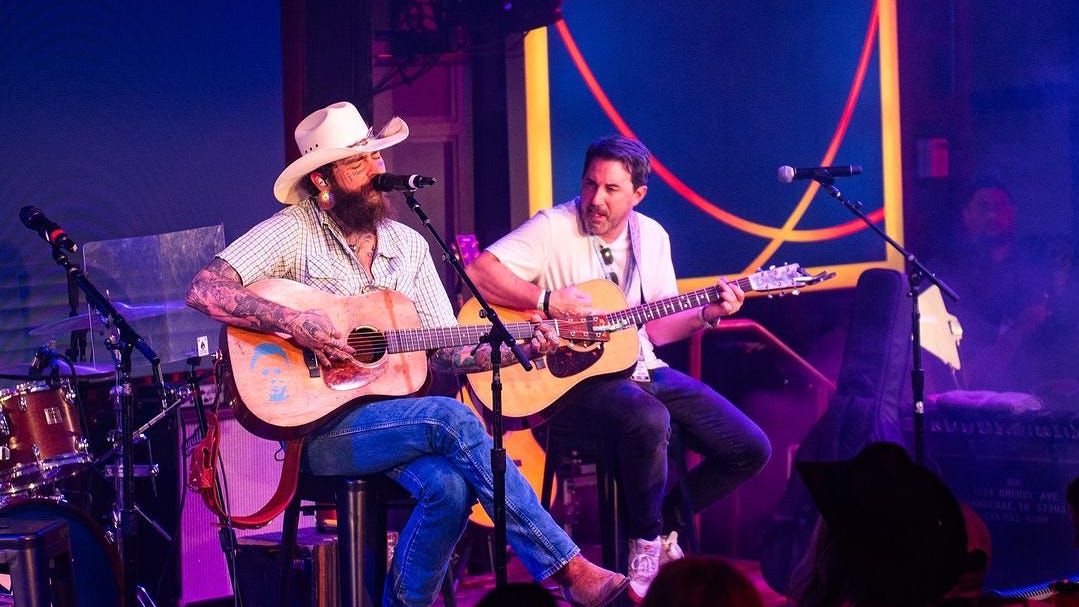Spotify’s annual Music Economics Report has been released amid a flurry of concerns raised by Nashville-based creatives about streaming’s impact.

Post Malone surprises Nashville with performances on both sides of the Cumberland Riverne
Post Malone performed twice on the first night of CMA Fest, appearing at Nissan Stadium and Ole Red’s Spotify House.
- Spotify’s 2024 annual report highlights the continued growth of music streaming revenue, with the platform paying out a record $10 billion to rights holders.
- Despite record revenues, Spotify faces criticism from songwriters and publishers over royalty rates, particularly regarding the bundling of audiobooks with premium subscriptions.
- The report concludes by highlighting the potential for continued growth in the music streaming industry, but acknowledges the need to address concerns about artist compensation and sustainability.
Newly released data from digital music service Spotify‘s Music Economics Report highlights trends in the economics of music streaming, with 2024 marking a two-decade pinnacle for ad-supported, on-demand and paid-subscription streaming.
Digital streaming now represents a 60 times greater share of domestic recorded music industry revenue and 85% of all U.S. recorded music industry revenue compared to 2005, according to Recording Industry Association of America data.
While digital streaming has allowed millions to easily share their music globally, 2024 also marked the first year in which representatives from the streaming platform have acknowledged that the sheer volume of uploaders means the fraction who find success appears smaller over time.
“More than at any time in music history, thanks to streaming, more artists than ever are generating royalties at every career stage — and we think that’s what really matters,” representatives from Spotify said in a statement.
However, as fans’ access to all music — Nashville-created mainstream country among them — continues to soar, numerous impasses remain between an activism-driven group of wildly successful Music City songwriters and the streaming platform.
Four of the five songwriters nominated for Grammy’s Songwriter of the Year, Non-Classical category — Nashville-rooted Jessi Alexander, Amy Allen and Jessie Jo Dillon and British singer-songwriter RAYE — would not attend the Spotify Songwriter of the Year Grammy party on Jan. 28. The boycott came from Spotify’s April 2024 decision to cut royalty rates on premium streams for songwriters and publishers by “bundling” audiobooks to its premium subscription tiers.
(Spotify representatives have clarified in a note to The Tennessean that the party eventually did not occur due to the Los Angeles wildfires)
“After some thought, I couldn’t in good conscience support this initiative given their approach to bundling royalties,” Songwriter Jessie Jo Dillon told Billboard magazine. “It is very nice to be individually honored, but it is better for me and my entire songwriter community to be paid fairly for our art. There are no songs without songwriters.”
More bluntly, 2023 Grammy Songwriter of the Year nominee Laura Veltz added, “Spotify is robbing you. Songwriters: do not fall for this horse s—,” in a social media statement.
New data offers no solutions. However, it also provides a sense that an unprecedented situation could yield the foundations of ideas that define how, as it surges closer to earning nine out of every ten recorded music industry dollars, streaming could develop unprecedented strategies to satisfy a wider net of creatives requiring compensation for their work.
Music City’s creative community has reservations about streaming’s boom
America’s music marketplace is responsible for 60% of the nearly $30 billion the International Federation of the Phonographic Industry reports as the total value earned in 2024 by the global recorded music industry.
Nashville’s country music industry is a crucial part of the global industry. John Stein, Spotify’s head of North America editorial said in a 2024 Tennessean feature that country music “unprecedentedly (connected) with anyone interested in good music.”
Stein added that there has been over a 20% global increase in monthly streams for country genre in 2024 versus the previous year.
The Nashville-based Mechanical Licensing Collective (MLC) filed a 2024 lawsuit in the United States District Court for the Southern District of New York, stating that Spotify’s “bundling” measures are unlawful.
Two months ago, the MLC lost that case. In a decision issued on Jan. 31, Judge Analisa Torres ruled in favor of Spotify, writing in her opinion that “MLC cannot plausibly claim that having access to audiobooks is not something of intrinsic and monetary value to many, even if only a fraction of Spotify’s millions of Premium subscribers may take advantage of it.”
Spotify celebrates record-breaking revenues
Spotify highlights that they’ve paid nearly $4.5 billion of “record-breaking revenues driven by streaming services” to publishing rights holders who represent songwriters over the last two years.
Across the board, revenues for music are created more than ever and earnings are being adjusted to a wholesale shift in how and from where they are generated.
Spotify data highlights that they have paid over $60 billion as a music industry retailer in the platform’s lifetime. However, nearly 20% of that revenue was in 2024 alone, with over $10 billion, representing more than any other company has paid in a year. That growth also represents 100% increase in Spotify’s revenue payments in the past decade.
“Spotify has been on a mission to get the world to value music again — and the system we’ve built together is working. Since the low point for the music industry of $13 billion in 2014, global recorded revenue has more than doubled to over $28 billion in 2023,” the company said in a statement, citing IFPI data.
Nashville’s country industry embraces globalism
Spotify said that, in 2024, nearly 1,500 artists generated over $1 million in royalties from the platform, with 80% not having a song that reached the Spotify Global Daily Top 50 chart. The company notes that artists with “loyal fanbases that keep coming back” are willing to “collaborate with artists from abroad to connect with fans far beyond their home markets” to sustain their growth.
The 2025 London C2C country festival headliner and country music’s 2023 Entertainer of the Year Lainey Wilson’s latest single is a take on UK-based singer-songwriter Myles Smith’s “Nice To Meet You.” Dig deeper and 33% of the headliners listed on the advertising flyer have achieved chart-topping success on Billboard’s country radio charts. The other 66% have all been frequently playlisted artists on digital services like Spotify.
What began as a process in 2014 that saw electronic music acts like Diplo and Skrillex making cross-cultural and genre leans into global stardom was mirrored by reggaeton and Latin trap acts like Bad Bunny and J Balvin. A decade later, Nashville’s country industry is doubling down on the strategy and is attempting to expand upon EDM’s success that Latin American performers replicated.
Streaming revenue growth, sustainable compensation, at a crossroads
For Spotify, streaming creates an unprecedentedly deeper and wider global music industry economy, the proverbial tide that lifts all ships. They note that the number of artists generating royalties at every earning threshold on the site — from $1,000 to $10 million per year — has at least tripled since 2017.
“Independent musicians, less mainstream artists and niche genres can all thrive in the new streaming economy. Success in the streaming era doesn’t require a chart-topping hit or a decade-spanning catalog,” Spotify’s representatives said in a press statement.
Offering that they eclipsed “over 10x the contribution of the largest record store at the height of the CD era” by paying out more than any other retailer or streaming service in 2024, it still leaves considerations at the crossroads regarding revenue earnings by the creators that define the Nashville-led American music industry.
“Over the past decade, Spotify has aided in ushering in unprecedented openness in the music industry,” Stein said. “It continues to get easier to explore unfamiliar new genres and songs at the click of a button. When artists popular to our users authentically blend genres and Spotify’s platform (can cultivate that authenticity), incredible success continues to become easier to occur.”







